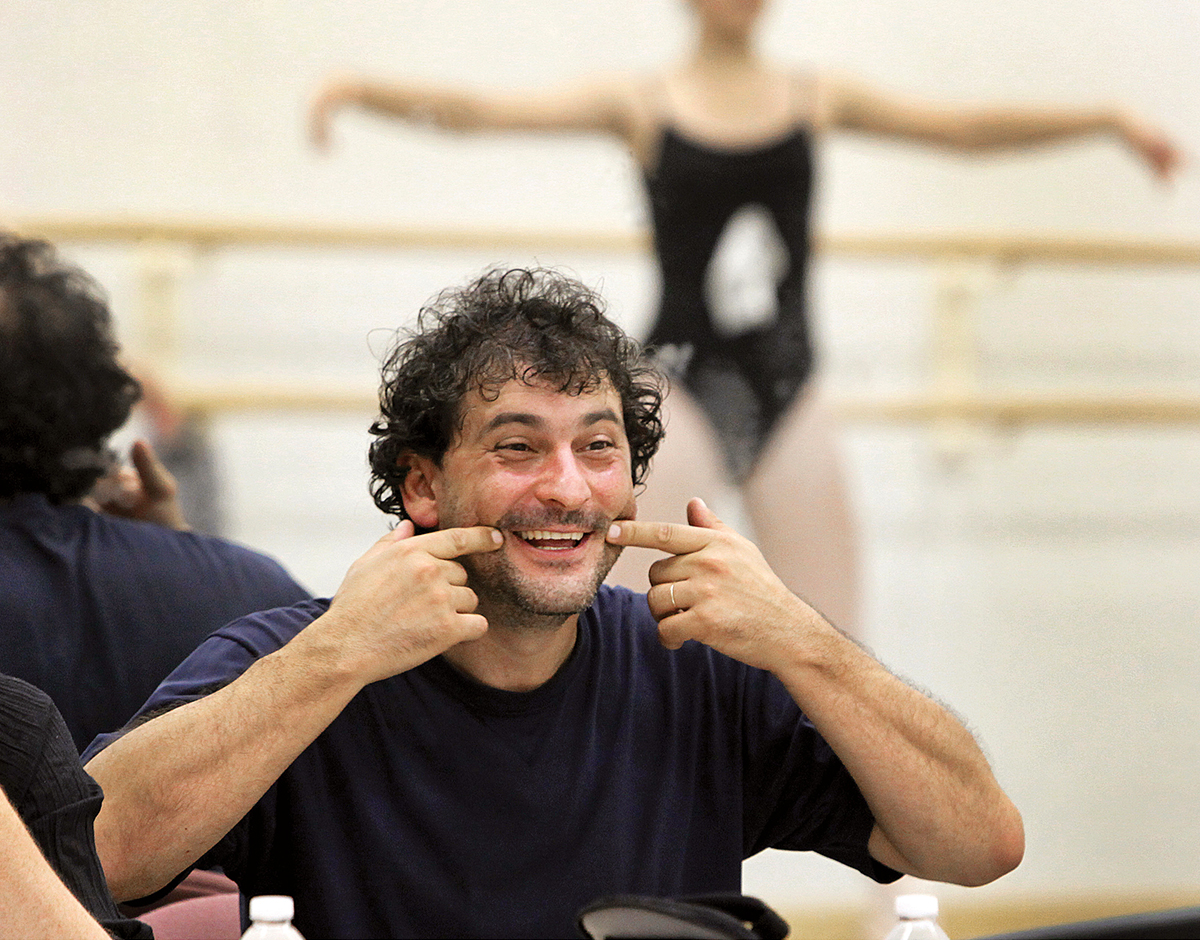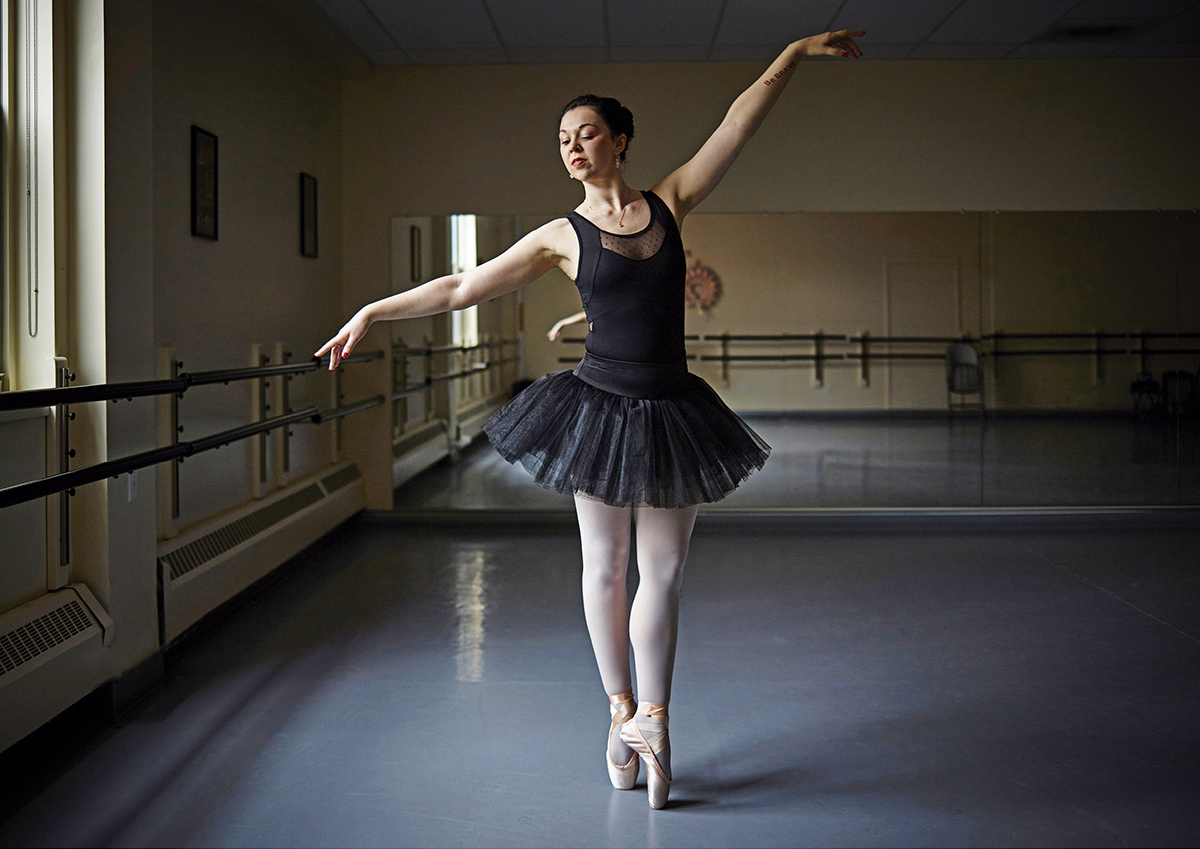My (Tor)Mentor

Dance instructor Cosmin Marculetiu categorically denies Lissa Curtis’s allegations that he sexually assaulted her at an international ballet competition in Romania. / Boston Globe/Getty Images
In ballet, the master-student relationship is unlike any so-called normal relationship—foreign territory to everyone outside that cloistered world. It is a complex and multi-layered connection that few people will likely ever experience, often matching an older teacher with a younger pupil working together toward a common goal: making the dancer the best she can be. The hours are grueling, the physical demands are punishing, and the unique intimacy that develops can—if history is any indicator—blur the line between intensity and passion, complicate the learning process, and upset the highly charged dynamics between the ingénue and the master.
Take, for instance, George Balanchine, the brilliant Russian choreographer, artistic director, and founder of the New York City Ballet. Known as the 20th century’s “father of American ballet,” he was prone to fixating, obsessively and romantically, on his creative muses. He married and divorced four wives, each one a dancer in his company or in a ballet that he choreographed. Although never his wife, Suzanne Farrell, one of the most celebrated dancers in U.S. history and now the artistic director of her own company at the Kennedy Center, admitted years later that she briefly contemplated suicide to escape what the New York Times called “their suffocatingly intense relationship.” Author Evan Zimroth’s Collusion: Memoir of a Young Girl and Her Ballet Master offers a brutally honest account of a young dancer’s narcissistic obsession with—and ultimate defiance of—her seductive and abusive Russian ballet instructor.
When it comes to the teacher-student dynamic, says Boston-based clinical sport psychologist Sharon Chirban, subordinates typically yearn for validation, approval, and praise—and when they get it, they might push themselves past a healthy point to keep it. “If you think the artistic director has a special thing for you, it’s like cocaine,” says Chirban, who has worked with clients from the Boston Ballet Health Alliance, the Boston Marathon Symposium, and the U.S. Figure Skating Association. “All you can think about is pleasing that person. You don’t want that person to fall out of interest in you.”
Even in adults, this worldview can create distortions—a blindness of sorts—that obscure what Chirban calls “micro boundary violations” committed by the person in control. On the flip side, power figures are also exposed to vulnerabilities, she says, like the unprofessional feelings that surface when you realize your protégé is idealizing you beyond the norm. This phenomenon can make either person in the relationship vulnerable, and can create conditions that are ripe for exploitation.
In a Massachusetts civil lawsuit as well as in-person, telephone, and written interviews that Boston conducted with Curtis and her lawyer, former New Hampshire Attorney General Michael Delaney, Curtis claims that Marculetiu repeatedly sexually assaulted and raped her during their trip to Romania. Marculetiu, who through his attorney declined to comment directly for this story, categorically denies that he ever abused or sexually violated Curtis and has filed a counter-lawsuit against her, with allegations including defamation and abuse of process. Marculetiu’s attorney says that simply because Curtis claimed something in a lawsuit doesn’t make it true. This story is based on allegations described in Curtis’s lawsuit and in interviews with her. She says that the attacks began 35,000 feet in the air, somewhere over the Atlantic Ocean.
Aboard the outbound flight from Boston, Curtis nodded off next to Marculetiu. She might have slept until it was time to land, but something suddenly jarred her awake: Marculetiu’s hands, she alleges, had crept down her pants and up her shirt while she dozed. Disoriented, she immediately froze. “I actually pretended to continue to be asleep because I didn’t know what to do,” Curtis says. “I thought I was dreaming.”
Time lost all meaning as she searched for a response. Screaming would…what? Disrupt the flight? Wake the other passengers? Make her look crazy? Before she could move, the cabin lights snapped back on, she says, and he pulled away. When she looked at him, he seemed oblivious and “started to make small talk, just stupid stuff,” she says. “And I’m sitting there, frozen.”
Curtis remembers more uncomfortable moments during a layover in Munich: Marculetiu grabbing her hand, putting an arm over her shoulder, and sliding his fingers over her inner thighs under a table while his son, Alex, sat across from them. She worried that Alex noticed. Did she want him to notice? Would he have questioned it? It felt like reality had shattered in her head, and she couldn’t make the pieces fit back together. As abruptly as it had begun, she says, the groping stopped when Marculetiu spotted several colleagues who were on their connecting flight to Sibiu, Romania. For the rest of the trip until they arrived at the Hotel Ibis, Curtis says he ignored her. It was like it had never happened.

Curtis has recently become a strong voice for survivors of sexual assault, launching a “Be Brave” campaign to raise awareness about speaking up. / Photograph by Christopher Churchill
The first thing that struck Curtis when she stepped off the airport shuttle into the hotel was the chaos. Dancers swept through the modern lobby dragging bulky bags filled with dazzling costumes and pointe shoes. Longtime friends and luminaries in the ballet world greeted one another with bursts of foreign conversation that Curtis couldn’t understand. Still wearing the clothes she’d put on at home so many hours and a continent ago, she felt alone in a place where everyone else seemed so at home.
At the front desk, Marculetiu helped fill out her hotel forms, which were all in Romanian. She claims that he kept an extra key to her room, just in case she lost hers, but she didn’t think twice about it. It was just one more detail her teacher handled in the blur of their arrival: the rooms, the schedule, the people. Because like it or not, this was definitely Marculetiu’s home turf.
Born in the Transylvania region of Romania, Marculetiu was discovered at age nine in a countrywide talent search that led him to attend the Academy of Arts and Choreography in Cluj-Napoca. As a soloist with the Romanian National Ballet, he once told the Globe, he threw up after performing each scene because it was so hard on his body. As with many elite dancers, however, that intense level of discipline and commitment fulfilled him. He went on to make a name for himself as a member of several companies throughout Europe, including the Croatian National Ballet, in Zagreb (where he met and married his wife, Melinda) and a company in Dresden, Germany. Along the way, he weathered six knee surgeries, telling the Globe that “one of my vertebrae is gone from lifting. Ballet is a very brutal job.”
In 2002, Marculetiu and Melinda moved to the Boston area with Alex to pursue careers as ballet educators. Melinda, a U.S. citizen, had spent much of her early career dancing in Virginia. Marculetiu soon established himself as an accomplished teacher at the Boston Arts Academy, Jose Mateo Ballet Theatre, in Cambridge, and Festival Ballet Providence. He continued to perform until 2009, when he retired after nearly three decades of professional dancing. “I want the audience to remember me on stage as I used to be,” he has said, “instead of thinking, ‘What is this old guy doing up there?’ Let the young and powerful have their turn—now I teach them how to be beautiful.”
In 2010, Marculetiu and his wife finally opened their own nonprofit school, calling it the International Ballet Academy of Norwell. They quickly attracted a cadre of loyalists on the South Shore, and the school’s reputation spread by word of mouth. The Globe praised Marculetiu for his Vaganova teaching methods, which prize athleticism and strength in the entire body, painting him as an old-world ballet instructor who invests in his students’ careers. “I think this place is different than most American studios,’’ one student told a reporter after the school opened. “They have more of a European style. They expect a lot of you, but they’re also fun and inspiring. You never forget why you are a dancer here.’’


